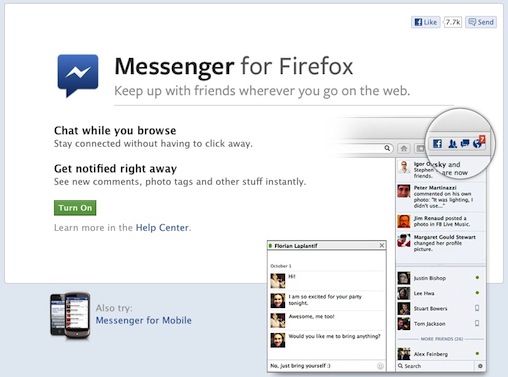Mozilla Tuesday released Firefox 17, which debuts technology that lets developers integrate social networks -- for now, Facebook -- with the browser.
The company also patched 29 security vulnerabilities, two-thirds of them marked "critical," Mozilla's highest threat ranking.
The main thrust of Mozilla's trumpeting of Firefox 17, however, was what it called "Social API," an application programming interface (API) that allows developers to bake connections to social media services into the browser.
The first result of the API, Facebook Messenger for Firefox, displays a sidebar that shows Facebook chat sessions and updates, including new comments, without requiring the user to steer to Facebook's website. Additional tools range from message notifications to friend requests, accessible through new icons in the browser's toolbar.
Firefox 17 users can enable Messenger at this Facebook page, and the social networking giant has posted a short FAQ on the integration with Firefox.
Firefox 17 also debuts a new security feature that automatically blocks outdated versions of the most popular Web browser plug-ins -- Adobe's Flash Player and Reader, Microsoft's Silverlight, and Oracle's Java -- from executing content.
Dubbed "click-to-play," the added protection bars content from running in plug-ins Mozilla determines are unsafe or seriously out of date. (The company posts a list here.) Users can override the block, or before doing that, investigate by clicking a new icon that appears on the left edge of the browser's address bar.
Click-to-play is only the latest in a series of steps Mozilla has taken this year to stymie attacks, including blocking outdated Java plug-ins on Macs last spring when the Flashback malware infected several hundred thousand machines, and wrapping up work on silent updates to emulate Google's long practice of removing updates from users' responsibility.
Along with the new additions, Mozilla also subtracted: It pulled the plug on support for OS X Leopard, Apple's 2007 operating system.
The move had been in the works for almost a year, with the final decision coming in August. Firefox 16, which shipped Oct. 9, was the last version able to run on Leopard.
According to Web metrics firm Net applications, only about 9% of all Macs still run Leopard; nearly two-thirds run either its successor, Snow Leopard, or that edition's follow-on, Lion. Most of the rest are powered by 2012's Mountain Lion.
The open-source developer also patched 29 vulnerabilities, 19 of them critical, with nine of the remaining labeled "high" and one pegged "moderate."
Nearly a third were reported by Abhishek Arya, who goes by the nickname "Inferno," of the Chrome security team, Mozilla said in an accompanying advisory. He was also credited with reporting five more vulnerabilities that were "introduced during Firefox development that were fixed before general release."
Another four were submitted by "miaubiz," a long-time contributor to Google's bug-bounty program.
By Net Applications' estimates, Firefox accounted for 20% of the browsers that went online last month. Irish measurement firm StatCounter, however, pegged Firefox's global share for October at a slightly higher 22.3%.
Windows, Mac and Linux editions of Firefox 17 can be downloaded manually from Mozilla's site. Installed copies will be upgraded automatically.
The next version of Firefox is scheduled to ship the week of Jan. 7, 2013, a slight delay from the usual six-week cadence to account for the end-of-year holidays.

Although Firefox 17 includes Facebook Messenger, users must switch it on at this Facebook page.





